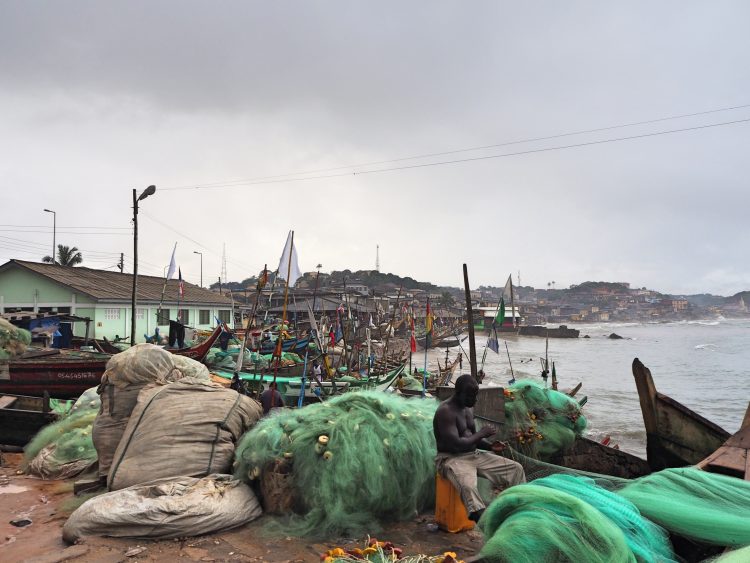 Story highlights
Story highlights
- International Institute for Environment and Development host conference on the Blue Economy
- The conference was part of IIED’s wider project work on moving towards an inclusive blue economy
- Two key issues were at the forefront of discussion, the Internationally Legally Binding Instrument (ILBI) in areas Beyond National Jurisdiction (ABNJ) and fiscal reforms
- Need for increased presence of small-scale fishers in ABNJ negotiations
The International Institute for Environment and Development (IIED) hosted the Towards an Inclusive Blue Economy conference, London from 25-25 February 2019.
The conference was a strategic international meeting as part of the IIED’s wider project work on moving towards an inclusive blue economy.
The conference in London brought together ocean experts, policymakers, fisheries associations, business and civil society representatives and stakeholders to consider strategies for developing national economies that protect marine resources and people’s livelihoods and make sure that the benefits of the ocean are shared equitably. This, in fact, is the definition of an Inclusive Blue Economy. A term which is increasingly appearing in international ocean policy.
The conference touched upon two main topics: The Internationally Legally Binding Instrument (ILBI) under the United Nations Convention on the Law of the Sea on the conservation and sustainable use of marine biological diversity of areas Beyond National Jurisdiction (ABNJ) and fiscal reforms to achieve an inclusive blue economy.
“In theory a Blue Economy is supposed to cater for social and ecological sustainability aspects. However, a blue economy will not become inclusive nor equitable by default,” says SwedBio marine programme officer Hanna Wetterstrand who attended and reported back on the conference.
Negotiating benefits for all
Areas beyond national jurisdiction are areas outside of the economic zones of nations. These areas are also referred to as the ‘high seas’ or ‘international waters.’ They are found 200 nautical miles from nations coastlines and include the ocean floor. The not yet utilised value of the oceans is estimated to USD 24 trillion including sectors like energy generation, maritime transport, tourism, capture fisheries and aquaculture (Hoegh-Guldber, et.al 2015).
With such unclear jurisdiction and such a high economic value, how do we ensure that future high seas governance regimes or treaties are equitable and benefit all? This was one of the key questions put forth by the conference hosts.
While conventions exist to protect these areas, they often fail to keep up with the rate of development and resource exploitation. The 1982 United Nations Convention on the Law of the Sea (UNCLOS), recognize the ocean floor as ’common heritage of mankind’ and the benefits arriving from it are intended to be shared equitably among people. Today, deep sea mining and the extent and intensity of high seas fishing was not in any imaginable pipeline. This has resulted in a big gap in governance to deal with these kinds of issues.
The purpose of the marine Areas Beyond National Jurisdiction (ABNJ) negotiations is to develop a benefit sharing mechanism as soon as possible. These negotiations are expected to come to an end during the first half of 2020.
These negotiations are usually presented as structured around four main areas:
- Marine genetic resources, including issues of access and benefit sharing
- Area-based management tools, including marine protected areas
- Environmental impact assessments, and
- Capacity building and transfer of marine technology.

Protecting vulnerable coastal communities
Throughout the conference there was a genuine focus on the rights of small-scale fishers (SSF) and vulnerable coastal communities, with at least two representatives from the SSF sector present in the conference, invited as key note speakers.
More than 47million people involved in small-scale fishing and trading are dependent on good governance of the high seas. Despite this, research indicates that many governments of developing alongside civil society organisations advocating for the rights of SSF, do not prioritise engaging in the ABNJ negotiations.
Throughout the ABNJ negotiations there has been a small group of countries disproportionally active, while Least Developed Countries and Small Island States are significantly underrepresented. This creates a risk of a skewed negotiation outcome which does not contribute to the conservation, sustainable use and benefit sharing that it was set out to achieve.
“My guess is the reason for this inequality in the engagement in the negotiation probably has to with the existing economic inequality in between the countries. I also sense a belief that the high seas seem far away. It is perceived as something that does not impact coastal areas significantly. With limited resources, they might reason that they also have many more urgent issues to deal with closer to home,” says Hanna Wetterstrand, SwedBio programme officer.
In one of the conference sessions, Ekaterina Popova, an ocean modeller from the UK’s National Oceanography Centre, made a convincing argument for why Least Developed Countries and the Small Scale Fishers advocates should be concerned about the High Seas governance.
“Ecologically, [the high seas] are very much connected to coastal zones. There are two pieces of evidence for this. One is the migratory nature of species, often migrating through corridors between the high seas and coastal waters. The other is ocean currents. People do not realise how fast and vigorous these are and how tightly they connect to coastal waters,” Popva explained.
She held up a small yellow rubber duck to the audience and said that if a million ducks like that would be released into the high seas, it would take only six months until we would see them pop up on our coasts. Thus, exploitation of the High Seas will have noticeable impacts on the livelihoods of small-scale fishers.
Marine genetic resources
There are other issues around equity which might explain why some nations are more interested in the negotiations than others. For example, ten developed nations currently catch 71% of all fish caught in the high seas. Recent research from Stockholm Resilience Centre researcher, Robert Blasiak, found that 98% of all patents originating from marine genes taken in the High Seas come from 10 nations.
Existing international law under the Convention of Biological Diversity have already developed an access and benefit sharing mechanism to ensure benefits gained from the high seas, including from living-organisms (like fish) are shared equally.

It was also discussed by participants at the conference that there is a need for capacity building and transfer of relevant marine technology to developing nations. The International Institute for Environment and Development (IIED) argued the need for a mechanism to be set up by an independent multilateral institution that would facilitate the “cooperation and inclusive multi-stakeholder partnership and broker technology transfer and capacity building.” The idea is that developed countries should be obliged to regulate the private sector so that any resource access they gain will be attached to commitments for technology transfer to developing nations.
The hope is that these discussions clarify to both small-scale fishers and the governments of Least Developed Nations and Small Island States that they stand a lot to gain from engaging more strongly in the ABNJ negotiations. Furthermore, since exploitive activities in the High Seas risk to negatively affect the already vulnerable coastal communities, they should be given a clear voice.
Taxes in the sea
The second topic of the conference was that of fiscal reforms. Examples of fiscal tool are taxes, tariffs, fees and penalties among others. There was a general conclusion that there is a large un-tapped opportunity to use fiscal tools for enhancing sustainability and environmental stewardship.
Taxes for instance are usually used by policymakers to collect taxes rather than to guide a change in behaviour, such as more sustainable and environmentally sound fishing management. There is a large amount of alternative measures that could be brought into steering development in a positive direction. “For instance,” Hanna Wetterstand explains, “a government can start fairly compensating coastal communities when, for conservation purposes, marine no-take zones are established that negatively affect their livelihood. Tax schemes must be designed carefully in order to care for gender issues and adapt to the local circumstances.”
“Today 86% of the global subsidies to the fish sector goes to large scale fishing, 16% to small scale fishers and only 4% to the process sector where most women are involved. Simultaneously as making use of fiscal tools so enhance sustainability and equity, the harmful fisheries subsidies should be eliminated,” explains Professor Ussif Rashid Sumaila, Professor and Director of the Fisheries Economics Research Unit at the University of British Columbias’s Institute for the Oceans and Fisheries.
These figures were used again by Editrudith Lukanga, the general secretary for the African Women Fish Processors and Traders network and Co-President of World Forum of Fish Harvesters and Fish Workers, when advocating for increased subsidies to Small Scale Fishers and in particular to women in the trading and processing sectors.
“Women play a crucial role in the small scale fishery sector (SSF) and their role should be increasingly recognised. About 47% of workers in the Small Scale Fisheries sector are women and in the post-harvest, it is as much as 90%.” Despite this number, Lukanga goes on, “they are still they looked down upon by policy makers since their contribution to the national GDP is ‘negligible’”. “Women in the SSF sector should also have right to influence decisions that affect them”, Lukanga emphasises.

 Hanna Wetterstrand
Hanna Wetterstrand